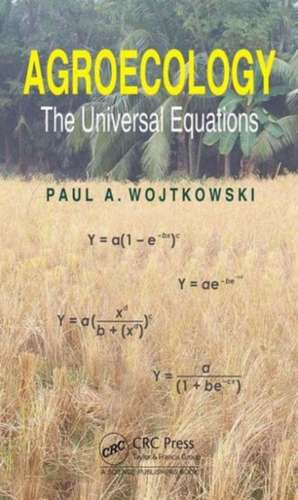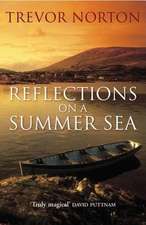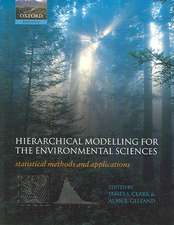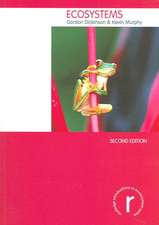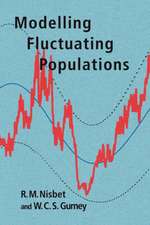Agroecology: The Universal Equations
Autor Paul Wojtkowskien Limba Engleză Hardback – 16 dec 2015
| Toate formatele și edițiile | Preț | Express |
|---|---|---|
| Paperback (1) | 313.40 lei 6-8 săpt. | |
| CRC Press – 18 dec 2020 | 313.40 lei 6-8 săpt. | |
| Hardback (2) | 784.81 lei 6-8 săpt. | |
| Springer International Publishing – 3 apr 2019 | 961.55 lei 3-5 săpt. | |
| CRC Press – 16 dec 2015 | 784.81 lei 6-8 săpt. |
Preț: 784.81 lei
Preț vechi: 957.09 lei
-18% Nou
Puncte Express: 1177
Preț estimativ în valută:
150.17€ • 157.63$ • 124.65£
150.17€ • 157.63$ • 124.65£
Carte tipărită la comandă
Livrare economică 10-24 aprilie
Preluare comenzi: 021 569.72.76
Specificații
ISBN-13: 9781498745024
ISBN-10: 1498745024
Pagini: 272
Ilustrații: 60
Dimensiuni: 156 x 234 x 20 mm
Greutate: 0.52 kg
Ediția:1
Editura: CRC Press
Colecția CRC Press
Locul publicării:Boca Raton, United States
ISBN-10: 1498745024
Pagini: 272
Ilustrații: 60
Dimensiuni: 156 x 234 x 20 mm
Greutate: 0.52 kg
Ediția:1
Editura: CRC Press
Colecția CRC Press
Locul publicării:Boca Raton, United States
Cuprins
Introduction. Core Concepts. Economic Underpinnings. Plot Ecology. Production Functions. The Intercrop. The Agroecological Matrix. A Comprehensive Algorithm. Temporal Agroecosystems. Risk Assessment. Complex Agroecosystems. Landscape Agroecology. Conclusion.
Descriere
Agroecology theory is not endless. A point is reached where the central elements become visible, equations distill, and a conceptual apex is reached. This is agroecology condensed into core concepts and theorems describing how crops relate to each other, the land, and their surroundings. This book covers advanced agroecology, including agroecological theory as well as applications of biodiversity that underwrite agroecology. Since much of agroecology theory is new, the resulting algorithms are equally novel, though presented so as to be useful and appreciated by less mathematically inclined professionals.
Notă biografică
Dr. Paul Wojtkowski is a writer, independent consultant, and an internationally recognized expert in land-use sciences (agriculture, forestry, and agroforestry). He has a Ph.D. in Forest Economics (University of Georgia, 1989). As an independent author, he has published eight books and several key articles on agroecology and agroforestry. Dr. Wojtkowski has extensive international experience. In presenting the problems, practicalities, best management practices found worldwide, he is able to provide singular insight into agroecology.
Textul de pe ultima copertă
This book presents the core elements that underwrite agroecology. Expressed across twelve chapters, the universality of the core is the essence of agroecology. This alone would be of interest to researchers, students, and academics. Furthermore, the book contains a long, detailed, and inclusive glossary that, with over 160 entries, elaborates on the topics presented. Included are recent developments as well as time-tested, traditional farm practices. The book also advances the theoretical base, fills gaps in the published research, and suggests future opportunities and future directions. The book is internationally oriented, presenting both temperate and tropical agriculture.
The book begins by comparing agroecology against conventional, monoculturally-based agriculture. In doing so, it defines the unique features of agroecology and their significance in achieving sustainable and environmentally-friendly agriculture. The book goes on to discuss the underlying technologies, the various manifestations of biodiversity, and the risk countermeasures associated with agroecology. This includes the farm landscape as a positive base for ecology, and how, if used well, it can produce major economic growth. The book concludes by summarizing the key findings, and assessing the macro-challenges facing agroecology.
The book begins by comparing agroecology against conventional, monoculturally-based agriculture. In doing so, it defines the unique features of agroecology and their significance in achieving sustainable and environmentally-friendly agriculture. The book goes on to discuss the underlying technologies, the various manifestations of biodiversity, and the risk countermeasures associated with agroecology. This includes the farm landscape as a positive base for ecology, and how, if used well, it can produce major economic growth. The book concludes by summarizing the key findings, and assessing the macro-challenges facing agroecology.
Caracteristici
Offers a complete reference source of the basics and core aspects of agroecology
Presents temperate and tropical agriculture, covering the totality of agroecology for an international audience
Written as a comprehensive resource for researchers, students and academics
Presents temperate and tropical agriculture, covering the totality of agroecology for an international audience
Written as a comprehensive resource for researchers, students and academics
